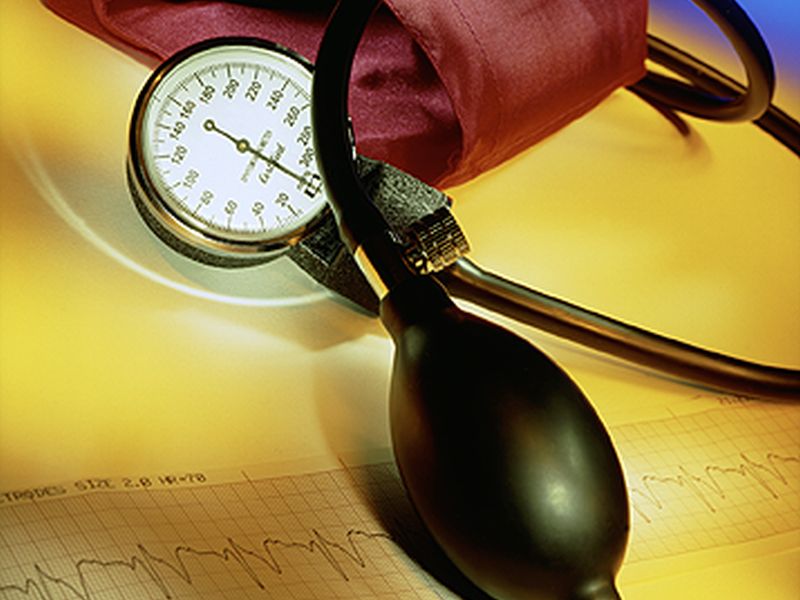SUNDAY, Sept. 17, 2017 (HealthDay News) — High blood pressure can lead to organ damage — and the risk isn’t limited to adults, new research suggests.
Along with a growing number of obese children in the United States, high blood pressure is on the rise — and with it the risk of organ failure in teens, the study shows.
But the study also found that damage to the heart and blood vessels can occur in teens who aren’t red-flagged as having blood pressure problems. These include teens with supposedly “normal” blood pressure.
If undiagnosed, high blood pressure can lead to “possible target organ damage in the brain, eyes, heart and kidneys,” said study leader Dr. Elaine Urbina. She is director of preventive cardiology at Cincinnati Children’s Hospital Medical Center.
The percentage of children with obesity in the United States has more than tripled since the 1970s, according to the U.S. Centers for Disease Control and Prevention. About 1 in 5 kids ages 6 to 19 today is obese, which sets the stage for serious health problems.
High blood pressure is one of those problems. It means the force of your blood pushing against the walls of your blood vessels is consistently too high, according to the American Heart Association. Over time, these blood vessels narrow, restricting blood flow throughout the body.
In young people, high blood pressure is measured in percentiles rather than blood pressure levels. Children and teens in the top 5th percentile are considered to have high blood pressure, also called hypertension.
For this study, Urbina’s team evaluated 180 teenagers, 14 to 17 years old. The researchers looked for organ damage in those whose blood pressure fell below the hazardous 95th percentile.
The research found evidence of heart and blood vessel damage, such as arterial stiffness, in some teens classified as having normal blood pressure — below the 80th percentile. They also discovered damage in the “mid-risk” group — those with blood pressure in the 80th to 90th percentiles — as well as in the high-risk group, which was above the 90th percentile.
To ensure your children are not at risk for high blood pressure that could lead to organ failure, Urbina suggests having their blood pressure checked at yearly doctor visits.
And parents should take a teen’s high blood pressure diagnosis seriously and closely follow the pediatrician’s advice to help prevent organ damage, said Dr. Karen Griffin, a member of the American Heart Association Council on Hypertension.
“The symptoms for advanced organ failure in teens would be the same as those for adults,” said Griffin, a nephrologist in Maywood, Ill., who wasn’t involved in the study.
“However, the teens in question are unlikely to have advanced end organ damage and will more often than not be [symptom-free],” said Griffin.
That’s not to say they remain unharmed.
“Early development of mild organ injury in this patient population means that unlike older adults, these teens are at risk of developing advanced stages of target organ damage earlier in adulthood with loss of productive years of life,” Griffin continued.
Urbina said some young people face higher odds for high blood pressure due to obesity, family history, poor diet and lack of exercise.
“Lifestyle changes — including maintaining a healthy body weight, reducing salt and regular exercise — can help,” Urbina said.
Doctors treat high blood pressure in young people using a combination of lifestyle changes and, in some cases, medications. Your child’s doctor will make recommendations for treatment based on three factors: gender, age and height.
Urbina uses noninvasive imaging of the heart to help diagnose and treat children with blood pressure in the high-normal range.
“The imaging study may be able to help in deciding who needs medication and who can benefit from lifestyle changes,” she said. “Doctors want to avoid overtreating patients who can use lifestyle changes to maintain healthy blood pressure, but they don’t want to miss a child who may be at risk for a heart attack.”
For any parents concerned about their child’s health, Griffin offers this advice: “It is important to teach your children a healthy lifestyle, especially good eating habits to help prevent the development of [high blood pressure].”
The research was scheduled for presentation Sunday at an American Heart Association meeting, in San Francisco. Studies released at meetings should be considered preliminary until published in a peer-reviewed medical journal.
More information
Find out more about hypertension in kids at the American Heart Association.
Copyright © 2026 HealthDay. All rights reserved.

